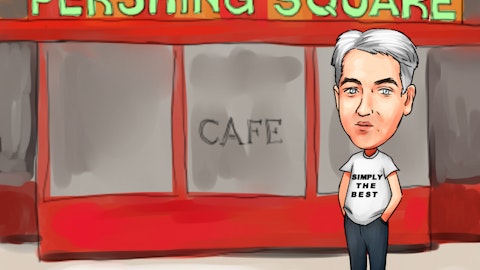We were not contacted by Mr. Carney by the time this piece re: this drawn out saga over Pershing was published yesterday. After being notified by a reader of the article a couple of hours ago, we sent Mr. Carney the message below, part of which he says he will put (with our permission) on CNBC.com. Thank you John.

Hi John,
We are deeply disappointed you wrote an article about Insider Monkey without giving us an opportunity to explain our claims.
We published an article explaining in detail why Pershing Square’s 15% return calculation isn’t accurate: https://www.insidermonkey.com/blog/2010/12/07/pershing-square%E2%80%99s-return-when-market-prices-aren%E2%80%99t-really-market-prices/
Pershing Square was able to buy 46 million additional shares at $10 per share because GGP management couldn’t sell more than 155 million shares in a public offering that was priced at $14.75. The management had the right to claw back Pershing Square’s $10 shares if they manage to sell them at a price greater than $10. They initially offered to sell 200 million shares at $14.75 but later reduced the size of the offering to 155 million shares. The question we have is why they did something like this that benefited Pershing Square along with other institutional investors. A Credit Suisse analyst is implying that they could have sold more shares but instead decided to create a short squeeze in GGP shares (after all, the company’s management themselves were getting the $10 shares as well, so a higher price benefits them). The Credit Suisse analyst’s accusation implies manipulation at best, fraud at worst. (Maybe the journalists at CNBC could shed some light on this story?)
We assumed GGP management didn’t have bad intentions and that they reduced the offering size simply because they couldn’t sell more than 155 million shares. As a result, Pershing Square was able to keep more shares that they bought for $10. The problem is they valued those shares at more than $16 when calculating their November returns. If those shares are really worth $16+, they would have been clawed back. Remember GGP management couldn’t sell those shares at $14.75? Pershing Square has nearly 90 million shares on their books. If those shares are worth more than $10, meaning there’s a potential buyer willing to buy 90 million or more shares, then we should contact the GGP management and ask them to raise the capital from those buyers.
This is their fiduciary duty anyway.
Pershing Square can’t have their cake and eat it too.
I would appreciate if you can publish our rebuttal and rectify the situation. We have readers contacting us stating that they will never follow our blog because of John Carney’s article. It was negligence on John Carney’s side not to contact Insider Monkey to hear their side before publishing a damaging story. The case we laid out above clearly shows why Pershing Square’s calculations aren’t accurate and CNBC readers should read our rebuttal too.
Thanks
Insider Monkey

